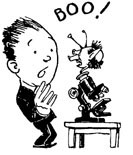
The Galileo Legend
POP SCIENCE & FALSE HISTORY
Popular legends are strange mixtures with curious effects. Although their historical elements may be mingled with erroneous claims, they often convey a measure of truth. This is one of the reasons such tales continue to be repeated, even when it is widely known that they omit or invent things. If we reflect on their themes, we can usually discern what makes them so durable. Take, for instance, the story about how the boy George Washington, having chopped down one of his father’s prized cherry trees, promptly owned up by saying, “I cannot tell a lie.” This story is known to be an invention of Mason Weems, an early biographer of Washington, but it endures because it expresses something that we regard as true and important about our first President — namely, that he was a man of great personal integrity. The facts relayed in the tale may not be worth much, but the story does seem to fairly represent Washington’s character.
The opposite is true of another presidential legend, the one about how Abraham Lincoln worked as a rail-splitter in his youth. This story relates fact yet gives a misleading impression. Lincoln did do work of this kind as a young man, but we would be mistaken to presume that this indicates something about his character. Lincoln did not like manual labor, and his rail-splitting had nothing to do with his development as a person or as a leader — especially not as a leader. Thus the story is not quite harmless. The rail-splitting story suggests that rustic simplicity makes for virtue, but this is sheer romanticism. Other presidents were born in log cabins and endured the hardships of pioneer life: None of them was a Lincoln. I wouldn’t say that tales of Lincoln’s humble beginnings are a serious deception, but they do draw attention away from other attributes more worthy of our notice. If anything from Lincoln’s youth marked him for greatness it was the passionate devotion to logical rigor and precise expression that he showed from an early age. These attributes, not the privations of frontier life, were what made him a great political architect.
Because it has factual basis, the Lincoln legend is far more seductive than the Washington story. In our milieu it is often assumed that “factual” simply means “true,” and that “facts speak for themselves.” But facts seldom do. Our convictions do not arise from facts alone but always from some whole, some picture that we compose from these smaller pieces of information. I introduce this interpretive problem because it is one of the mistakes at work in the well-known legend I wish to examine here. The most familiar popular legend about the relationship between Christianity and science is the story of Galileo’s persecution by the Catholic Church. In skeletal form, it goes like this: In 1609 Galileo Galilei turned his telescope on the heavens and made some observations that supported a theory set forth earlier by the Polish astronomer Nicholas Copernicus, that the Earth is not the center of the cosmos. Church officials objected that this view was incompatible with Scripture and should not be taught. In 1633, after Galileo had published a book defending the Copernican theory, he was forced to renounce his belief in this model of the solar system. The scientist, blind and in declining health, spent his final years under house arrest.
Each thing recounted here is a fact, but (as with the Lincoln legend) that does not mean that the picture commonly put together from these pieces of information is meaningful. To interpret these events, we would first have to answer at least three questions: Have other relevant facts been omitted? Has false information or embellishment been added? Is the overall picture the mind composes out of these pieces plausible and coherent? When these three questions are answered, this familiar, indeed “canonical,” version of the Galileo story shows itself to be highly unreliable.
You May Also Enjoy
Bells are used to warn or to summon. Bells express just about every mood and exigency; they are joyful, somber, pragmatic, ceremonial.
I recently attended a meeting in our parish on re-evangelizing lapsed Catholics, one of the…
Reviews of Mountains Beyond Mountains by Tracy Kidder... The Life of the Venerable Francis Libermann by G. Lee... A Bed for the Night by David Rieff

